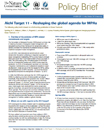The Nature Conservancy and UNEP-WCMC have highlighted the need for clear definitions of conservation objectives of Marine Protected Areas (MPAs), calling for more attention to the needs of people than of coverage increases alone.
The brief urges site selection that focuses on ecosystem services and benefits for people, and encourages benchmarks for evaluating MPAs and embedding MPAs in broader marine and coastal management strategies.
 9 October 2012: In a policy brief released at the 11th Conference of the Parties (COP 11) to the Convention on Biological Diversity (CBD), The Nature Conservancy (TNC) and the UN Environment Programme World Conservation Monitoring Centre (UNEP-WCMC) call attention to the need to improve definitions of protection, and reassess how to measure progress towards effective conservation, in the context of Aichi Target 11 on Marine Protected Areas (MPAs).
9 October 2012: In a policy brief released at the 11th Conference of the Parties (COP 11) to the Convention on Biological Diversity (CBD), The Nature Conservancy (TNC) and the UN Environment Programme World Conservation Monitoring Centre (UNEP-WCMC) call attention to the need to improve definitions of protection, and reassess how to measure progress towards effective conservation, in the context of Aichi Target 11 on Marine Protected Areas (MPAs).
Asking whether coverage is the right measure for success, the policy brief outlines that MPAs now cover 2.3% of the global ocean area, representing an increase from 2010 when their coverage was 1.31% and a quadrupling of MPA coverage over the last 10 years. A small number of large MPAs have driven this change, the authors note, with the 20 largest MPAs covering over 60% of the entire global MPA coverage, and most located far from people.
Aichi Target 11 aims to protect 10% of coastal and marine areas through effective and equitably managed systems of protected areas and other area-based conservation measures by 2020. Calling attention to the Aichi Target goals of using MPAs to support the needs of human communities, the authors stress that meeting the coverage targets is “meaningless if we do not also account for the needs of people.”
The brief contains recommendations for MPA creation and management, including to: identify areas that best safeguard ecosystem services and better link to delivering social, cultural and economic benefits to communities; develop and apply benchmarks for “effectively and equitably managed” MPAs; define “effective area-based conservation measures” in the marine environment, in particular for fisheries management areas; and integrate MPAs into wider marine spatial planning that reconciles conservation and development objectives. [Publication: Policy Brief: Aichi Target 11 – Reshaping the global agenda for MPAs] [TNC Press Release]